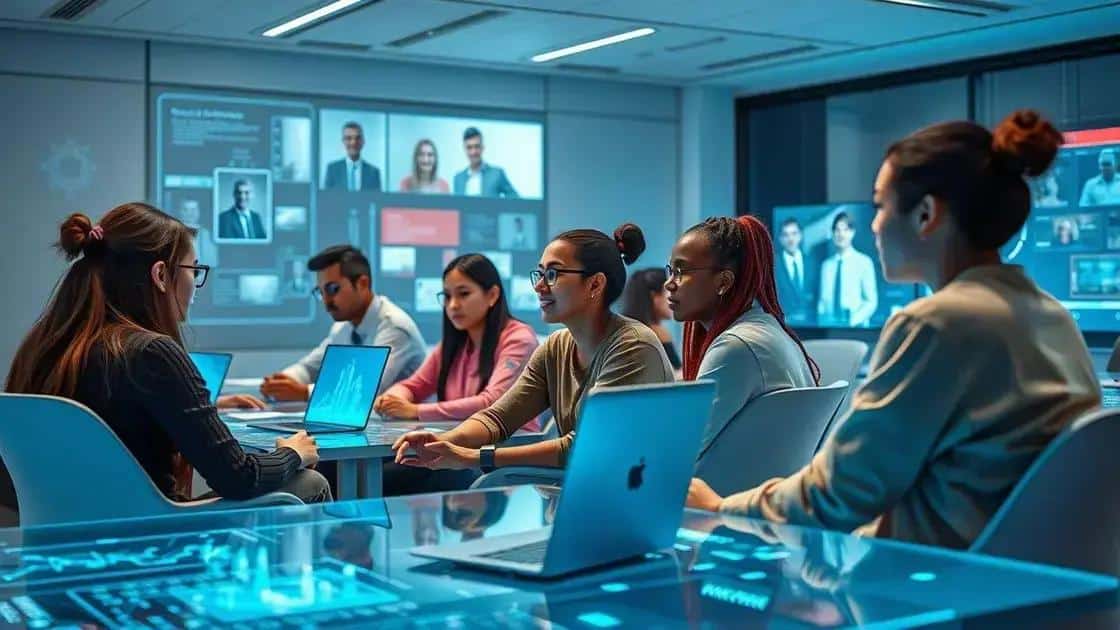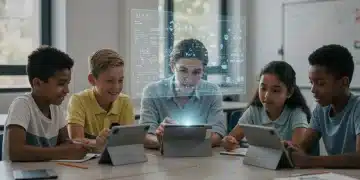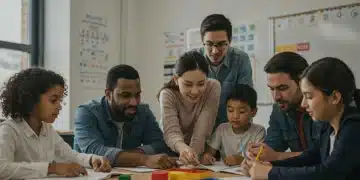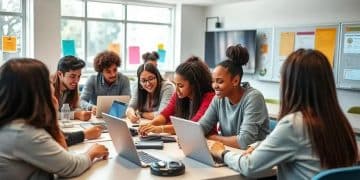Career readiness programs trends you can’t ignore

Career readiness programs trends focus on integrating technology, promoting lifelong learning, and enhancing mental health support to better prepare students for the evolving workforce demands and ensure their success.
Career readiness programs trends are evolving rapidly, reflecting the needs of both employers and job seekers. Have you noticed how these changes impact your career path? Let’s dive into what’s shaping these programs and why it matters!
Understanding career readiness programs
Understanding career readiness programs is crucial for students and educators alike. These programs aim to equip individuals with the skills they need to succeed in today’s competitive job market.
Many schools and colleges offer these programs, focusing on practical skills that employers value. These may include communication, problem-solving, and teamwork abilities.
Key Components of Career Readiness Programs
Effective career readiness programs consist of several important elements. For instance, they often integrate academic learning with real-world experiences. This combination enables participants to apply their knowledge in practical situations.
- Workshops for resume building
- Mock interviews to boost confidence
- Internships for hands-on experience
- Networking events with industry professionals
By participating in these activities, students can develop a stronger understanding of the job market. They learn not only what employers are looking for but also how to market their skills effectively.
The networking aspect of career readiness programs is particularly valuable. Students have the chance to connect with professionals in their desired fields, gaining insights into different career paths. This exposure can inspire them and help them make informed decisions about their future.
Measuring Success in Career Readiness
Assessing the effectiveness of these programs is vital. Many institutions track outcomes such as job placement rates and participant satisfaction to evaluate their success.
Throughout these programs, student feedback is crucial. It allows educators to adapt and enhance the curriculum to meet the changing needs of the workforce.
In summary, understanding career readiness programs is essential for fostering employability skills. These programs provide valuable resources that can significantly impact a student’s career success.
Key trends influencing program development

Key trends influencing program development in career readiness are continuously evolving. As the job market changes, so must the programs designed to equip individuals with essential skills.
One major trend is the increasing emphasis on technology. More programs incorporate digital tools and resources. This helps students gain relevant skills that employers are eager for. By embracing technology, programs can enhance learning experiences and better prepare participants for remote or tech-driven roles.
Collaboration with Industry
Another significant trend is the collaboration between educational institutions and industries. Partnerships allow career readiness programs to stay updated with the latest workforce needs. When schools work closely with businesses, they can develop curricula that reflect real-world demands.
- Guest lectures from industry professionals.
- Internships that provide hands-on experience.
- Feedback from employers on student performance.
- Joint projects between students and businesses.
This collaboration enriches the experience for students. They gain insights directly from the workplace, making their preparation more relevant and effective.
The focus on soft skills is also growing. Employers increasingly value attributes like communication and teamwork. Career readiness programs are therefore prioritizing these essential skills in their training. Understanding how to work well with others can set candidates apart.
Flexible Learning Options
Lastly, flexible learning options are becoming more common. Many programs now offer online courses or hybrid models, providing students with greater accessibility. This flexibility allows participants to learn at their own pace while balancing other commitments.
Overall, these trends relating to program development create a more robust framework for career readiness. By evolving with the times, these programs ensure students are equipped for future challenges.
Best practices for enhancing participant outcomes
Best practices for enhancing participant outcomes in career readiness programs are essential for effective training. Implementing successful strategies can significantly improve students’ skills and employability.
One of the most important practices is setting clear goals. Programs should outline specific objectives that participants can aim for. These goals help keep students focused and motivated throughout their training.
Interactive Learning Techniques
Using interactive learning techniques is another key practice. Engaging students through hands-on activities fosters better understanding and retention of skills. Programs that incorporate simulations, group projects, and role-playing give students valuable experience.
- Encouraging peer-to-peer learning.
- Utilizing case studies relevant to their field.
- Offering practical workshops to build confidence.
- Conducting regular feedback sessions for continuous improvement.
Feedback is crucial in enhancing participant outcomes. Programs should provide regular assessments and constructive feedback so students can track their progress and identify areas for improvement.
Moreover, incorporating networking opportunities can vastly expand participants’ horizons. Connecting students with professionals in their desired fields can lead to mentorship and job prospects. Networking events can also provide insights into industry trends and expectations.
Continuous Support and Resources
Offering continuous support throughout the program is vital. Providing resources such as counseling, resume workshops, and interview training can significantly benefit participants. Accessing these additional services can help them navigate their career paths more effectively.
Furthermore, ensuring programs are adaptable to individual needs enhances their effectiveness. Recognizing that each student has different learning styles and paces is essential. Tailoring the experience to suit these needs can lead to improved engagement and outcomes.
In summary, utilizing these best practices can create a more fulfilling learning experience that benefits both the participants and their future employers.
Future directions for career readiness initiatives

Future directions for career readiness initiatives are shaping how we prepare students for the workforce. With the job market constantly changing, these programs must adapt to stay relevant.
One emerging direction is the integration of artificial intelligence and data analytics into training programs. By utilizing these technologies, educators can personalize learning experiences, helping students focus on areas where they need the most improvement.
Emphasis on Lifelong Learning
Another key trend is the focus on lifelong learning. As industries change, professionals will need to continuously update their skills. Career readiness initiatives are now including options for ongoing education, such as online courses, workshops, and certifications that can be completed after initial training.
- Offering flexible online learning platforms.
- Promoting short courses relevant to current job demands.
- Encouraging participation in industry conferences.
- Providing career coaching for continuous development.
Additionally, these initiatives are beginning to prioritize mental health and wellness. Support for mental health can significantly affect students’ ability to successfully transition into the workforce. Programs are starting to include resources for managing stress and developing resilience in challenging work environments.
Collaboration with Tech Companies
Future career readiness programs are also looking to collaborate more with tech companies. Such partnerships can help in developing training that aligns with the latest technologies used in various industries. This collaboration leads to internships and job placements that offer students real-world experience.
Furthermore, a greater emphasis is being placed on soft skills training. Employers are increasingly looking for candidates who can communicate effectively and work well in teams. Training programs will increasingly include modules focused on developing these skills since they are often just as important as technical abilities.
Therefore, as we look to the future, career readiness initiatives are likely to become more dynamic, flexible, and supportive of the changing needs of both students and employers.
FAQ – Frequently Asked Questions about Career Readiness Initiatives
What are career readiness initiatives?
Career readiness initiatives are programs designed to equip students with the skills and knowledge needed for the workforce.
How can technology be integrated into career readiness programs?
Programs can use AI and data analytics to tailor the learning experience, making it more relevant to each student’s needs.
Why is lifelong learning important in career readiness?
Lifelong learning helps individuals keep their skills updated, ensuring they remain competitive in a constantly changing job market.
How do networking opportunities benefit students?
Networking allows students to connect with industry professionals, providing mentorship and opening doors for job placements.





